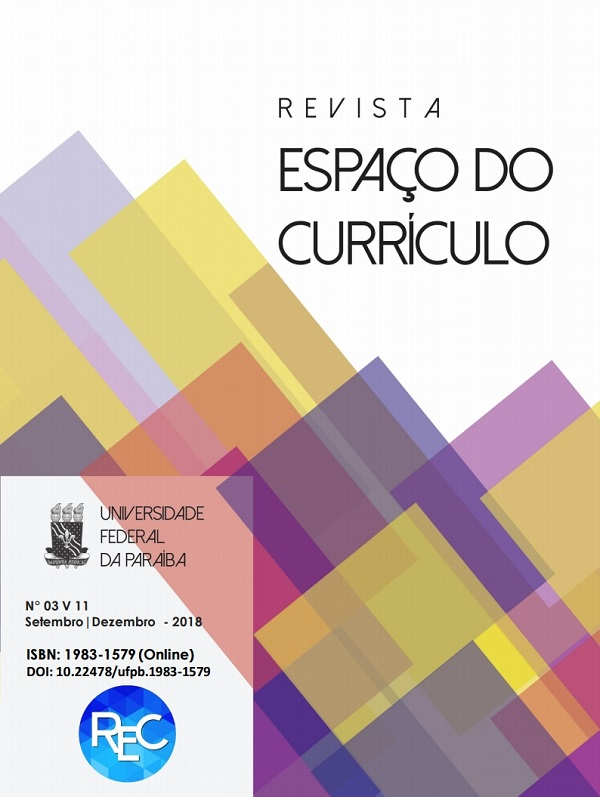CURRICULAR POLICIES AND EJA
the struggle for the meaning of gender in the context of teaching practice
DOI:
https://doi.org/10.22478/ufpb.1983-1579.2018v3n11.33465Keywords:
Curricular Policies, Curriculum, Genre, EJAAbstract
This article deals with the results of a research carried out at the lato sensu Specialization Course in Gender and Diversity in School (GDE), at the Federal University of Paraíba, under the responsibility of the Interdisciplinary Research and Action Group on Women and their Gender and Gender Relations. The research aimed to analyze how gender relations are expressed in the curriculum of the State Centers for Youth and Adult Education (CEJAs), in the city of João Pessoa / PB, and how these relationships are experienced by students in the teaching practices of the 3rd Segment (High School) of EJA. In the development of this analysis, the arguments of the Policy Cycle were used, based on the studies of Stephen Ball, Bower and Gold (1992) and Ball (1994), through the studies of Mainardes (2006, 2015) and Lopes (2011). Methodologically, analyzes were developed from a qualitative perspective, with ethnographic bias. For this we used participant observation, field notes and documents as data collection. It was perceived that there is a process of recontextualizing the ways in which curricular policies are (by) constructing gender relations in the EJA, a phenomenon that occurs in the context of the teaching practice, through the interpretations and critical positions evidenced in the teachers' attitudes And students of the school camp.
Downloads
Metrics
References
BOWE, R.; BALL, S. J. with GOLD, A. Reformingeducation&changingschools: case studies in PolicySociology. London: Routledge, 1992.
BALL, S. J. Educationreform: a criticaland post structural approach. Buckingham: Open University Press, 1994.
BRASIL. Resolução CNE/CEB nº 1, de 5 de julho de 2000, que estabelece as Diretrizes Curriculares Nacionais para a Educação e Jovens e Adultos. Disponível em: http://portal.mec.gov.br/secad/arquivos/pdf/eja/legislacao/parecer_11_2000.pdf. Acesso em: 22 Abr. de 2015.
______. Documento nacional preparatório à VI Conferência Internacional de Educação de Adultos (VI CONFINTEA). Brasília: MEC; Goiânia: FUNAPE/UFG, 2009. Disponível em: <http://portal.mec.gov.br/index.php?option=com_docman&task=doc_download&gid=10024&Itemid=>. Acesso em 2 de Abr. de 2015
______. Lei nº 9.394, de 20 de dezembro de 1996, que estabelece as diretrizes e bases da educação nacional. – 9. ed. – Brasília: Câmara dos Deputados, Edições Câmara, 2014.
CARVALHO, M. E. P. O que a história tem a ver com as relações de gênero? Problematizando o gênero no currículo e na formação docente. In: CARVALHO, M. E. P; PEREIRA, M. Z. C. (Orgs). GÊNERO E EDUCAÇÃO: múltiplas faces. João Pessoa: Editora Universitária/UFPB, 2003. p. 55-76.
HADDAD, S.; DI PIERRO, Mª Clara. Escolarização de jovens e adultos. Revista Brasileira de Educação, nº 14, mai/ago, 2000. p. 108-194.
LOPES, Alice Casimiro e MACEDO, Elizabeth. Contribuições de Stephen Ball para o estudo de Políticas de Currículo. In: Políticas educacionais: questões e dilemas. São Paulo: Cortez, 2011.
MAINARDES, J.. Abordagem do ciclo de políticas: uma contribuição para a análise de políticas educacionais. Educação & Sociedade. Campinas, vol. 27, n. 94, p. 47-69, jan./abr. 2006.
__________.; STREMEL, S. Informações sobre a abordagem do ciclo de políticas. 2015. Disponível em: . Acesso em: 05 de Set.de 2015.
OLIVEIRA, A.; MATHEUS, D.; LOPES, A. C.. Políticas de currículo: a luta pela significação no contexto da prática. In: FERRAÇO, Carlos Eduardo; GRABRIEL, Carmem Teresa e AMORIM, Antonio Carlos. Políticas de currículo e escola. Campinas, SP: FE/UNICAMP, 2011, p. 119-133.
OLIVEIRA, I. B.; TEIXEIRA, B. P.; CAMPOS, M. S. N.. Narrativas como prática emancipatória: pesquisando e repensando os currículos praticados na EJA. In: PAIVA, Jane. PINHEIRO, Rosa A. Da pesquisa em educação à pesquisa na EJA: ações plurais, sentidos singulares. Natal, RN: EDUFRN, 2011, p. 17-37.
________. PAIVA, J. (Orgs.). Educação de jovens e adultos. Rio de Janeiro: DPet alii, 2009.
PAIVA, J. Os sentidos do direito à educação de jovens e adultos. Petrópolis: RJ/FAPERJ, 2009.
PARAÍBA. Portaria nº 1.115, de 20 de novembro de 2014. Baixa instruções complementares para gestão de pessoal relativas ao ano letivo 2015 e dá outras providências. João Pessoa: Secretaria de Estado de Educação, 2014. Disponível em: http://static.paraiba.pb.gov.br/2013/12/Diretrizes-Operacionais-SEE-PB-2015.pdf. Acesso em: 25 de Fev.de 2015.
PEREIRA, M. Z. C. Currículo, discurso e discursos. In: MACEDO, Elizabeth; MACEDO, Roberto Sidnei; AMORIM, Antônio Carlos. (Org.). Discurso, texto, narrativa nas pesquisas em currículo. Campinas - SP: FE/UNICAMP, 2009, v. p. 114-123.
PROJETO político pedagógico. João Pessoa: [s.n.], 2015.
VALE, E. C.; OLIVEIRA, I. B. A ressignificação da EJA, o currículo e a centralidade da cultura: da educação popular aos processos de escolarização. In: I Congresso Internacional da Cátedra UNESCO de Educação de Jovens e Adultos. João Pessoa, 2010.
Downloads
Published
How to Cite
Issue
Section
License
By submitting an article to Curriculum Space Journal (CSJ) and having it approved, the authors agree to assign, without remuneration, the following rights to Curriculum Space Journal: first publication rights and permission for CSJ to redistribute this article. article and its metadata to the indexing and reference services that its editors deem appropriate.
















